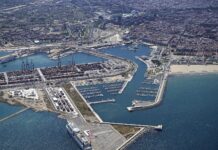
United Kingdom’s Port of Greenock will increase its reefer points from 32 to 220 with a significant investment of £750,000 (around US$950,000).
This upgrade to the port’s reefer capabilities is expected to facilitate access to global markets for food and drink manufacturers, with commodities like seed potatoes, meats, fish, fruit and vegetables and dairy products directly benefiting from the additional reefer points.
The expansion also brings huge benefits to pharmaceuticals manufacturers, the agriculture industry and other enterprises dealing with temperature-sensitive goods, according to Peel Ports Group, which owns and operates Greenock Ocean Terminal, Scotland’s leading west coast container terminal.
The investment has facilitated various upgrades, including the addition of a new substation to the port’s network, the construction of new purpose-built reefer gantries, and the upgrade of existing reefer facilities.
The expanded reefer points infrastructure at the Port of Greenock offers a range of benefits to manufacturers, cargo owners, freight forwarders, and shipping lines alike, including opening up alternative routes to market and additional capacity to export larger volumes of refrigerated cargo.
The expansion also eliminates the need for diesel generators, helping exporters to reduce the carbon emissions produced by their operations.
Craig Scrimgeour, Scotland Director at Drac Logistics, a firm which supports the import and export of perishable foods across the world, commented, “We’re really pleased to hear about this reefer investment at the Port of Greenock ahead of the imminent arrival of its two new ship-to-shore cranes later this year. This will significantly increase our ability to store and transfer our cargo, as well as our access to global markets. It’s really positive news for import and export companies across the country, and we believe it will support and attract new services into Scotland’s only deep water container port.”








